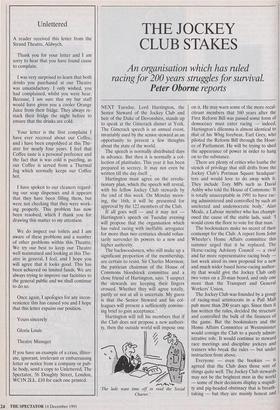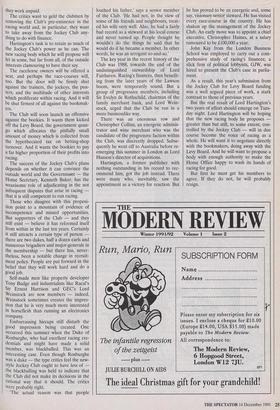THE JOCKEY CLUB STAKES
An organisation which has ruled racing for 200 years struggles for survival.
Peter °borne reports
NEXT Tuesday, Lord Hartington, the Senior Steward of the Jockey Club and heir of the Duke of Devonshire, stands up to speak at the Gimcrack dinner at York. The Gimcrack speech is an annual event, invariably used by the senior steward as an opportunity to present a few thoughts about the state of the world.
The speech is normally distributed days in advance. But then it is normally a col- lection of platitudes. This year it has been prepared in secrecy. It may not even be written till the day itself. , Hartington must agree on the revolu- tionary plan, which the speech will reveal, with his fellow Jockey Club stewards by the end of this week. On Monday morn- ing, the 16th, it will be presented for approval by the 122 members of the Club.
If all goes well — and it may not Hartington's speech on Tuesday evening will propose that the organisation which has ruled racing with ineffable arrogance for more than two centuries should volun- tarily surrender its powers to a new and higher authority.
The backwoodsmen, who still make up a significant proportion of the membership, are certain to resist. Sir Charles Morrison, the patrician chairman of the House of Commons bloodstock committee and a close friend of Hartington, says: 'I suspect the stewards are keeping their fingers crossed. Whether they will agree totally, partly or not at all is uncertain. My guess is that the Senior Steward and his col- leagues will present a sufficiently convinc- ing brief to gain acceptance.'
Hartington will tell his members that if the Club does not propose a new authori- ty, then the outside world will impose one
`The lads want time off to read the Social Charter.'
on it. He may warn some of the more recal- citrant members that 160 years after the First Reform Bill was passed some form of democracy must enter racing — indeed, Hartington's dilemma is almost identical to that of his Whig forebear, Earl Grey, who piloted the Reform Bill through the Hous- es of Parliament. He will be trying to shed the appearance of power in order to hang on to the substance.
There are plenty of critics who loathe the stench of privilege that still drifts from the Jockey Club's Portman Square headquar- ters and would love to do away with it. They include Tory MPs such as David Ashby who told the House of Commons: 'It is totally unacceptable in 1991 to have rac- ing administered and controlled by such an unelected and undemocratic body.' Alan Meale, a Labour member who has champi- oned the cause of the stable lads, said: 'I would cross the floor to vote for that man.'
The bookmakers make no secret of their contempt for the Club. A report from John Wheeler's Home Affairs committee this summer urged that it be replaced. The Horse-racing Advisory Council — a rival and far more representative racing body last week aired its own proposal for a new and much wider based horse-racing author- ity that would give the Jockey Club only two votes on a 20-man board, and only one more than the Transport and General Workers' Union.
The Jockey Club was founded by a group of racing-mad artistocrats in a Pall Mall pub more than 200 years ago. Since then it has written the rules, decided the structure and controlled the bulk of the finances of the game. But the bookmakers and the Home Affairs Committee at Westminister would consign the Club to a purely admin- istrative role. It would continue to steward race meetings and discipline jockeys and trainers who break the rules — but under instruction from above.
Everyone — even the bookies — is agreed that the Club does those sort of things quite well. The Jockey Club stewards may not be the brightest men in the world — some of their decisions display a stupidi- ty and pig-headed obstinacy that is breath- taking — but they are mainly honest and
they work unpaid.
The critics want to geld the clubmen by removing the Club's pre-eminence in the racing world and, in particular, they want to take away from the Jockey Club any- thing to do with finance.
Hartington's task is to retain as much of the Jockey Club's power as he can The new racing body which he will propose will let in some, but far from all, of the outside interests clamouring to have their say.
The racehorse owners will be offered a seat, and perhaps the race-courses will, too. But the door will be firmly shut against the trainers, the jockeys, the pun- ters, and the multitude of other interests which proliferate within racing. And it will be shut firmest of all against the bookmak- ers.
The Club will soon launch an offensive against the bookies. It wants them kicked off the Levy Board, the government quan- go which allocates the pitifully small amount of money which is collected from the hypothecated tax on betting-shop turnover. And it wants the bookies to pay a far higher proportion of their profits into racing.
The success of the Jockey Club's plans depends on whether it can convince the Outside world and the Government — the Home Secretary, Kenneth Baker, has the wearisome role of adjudicating in the not infrequent disputes that arise in racing — that it is still competent to run racing.
Those who disagree with this proposi- tion point to a mountain of evidence of incompetence and missed opportunities. But supporters of the Club — and they still exist — believe it has reformed itself from within in the last ten years. Certainly it still attracts a certain type of person there are two dukes, half a dozen earls and numerous brigadiers and major-generals in the membership — but there has, never- theless, been a notable change in recruit- ment policy. People are put forward in the belief that they will work hard and do a good job.
Self-made men like property developer Tony Budge and industrialists like Racal's Sir Ernest Harrison and GEC's Lord Weinstock are now members — indeed, Weinstock sometimes creates the impres- sion that he is very much more interested in horseflesh than running an electronics company.
Embarrassing hiccups still disturb the good impression being created. One occurred this summer when the Duke of Roxburghe, who had excellent racing cre- dentials and might have made a solid member, was blackballed. This was an interesting case. Even though Roxburghe was a duke — the type critics feel the new- style Jockey Club ought to have less of the blackballing was held to indicate that the Club did not make its decisions in the rational way that it should. The critics were probably right.
The actual reason was that people loathed his father,' says a senior member of the Club. 'He had not, in the view of some of his friends and neighbours, treat- ed his wife very well. Also, he had a fairly bad record as a steward at his local course and never turned up. People thought he wouldn't do the things he said that he would do if he became a member. In other words, he was an arrogant so-and-so.'
The key year in the recent history of the Club was 1988, towards the end of the undistinguished stewardship of Lord Fairhaven. Racing's finances, then benefit- ing from the later years of the Lawson boom, were temporarily sound. But a group of progressive members, including Sir Evelyn de Rothschild, chairman of the family merchant bank, and Lord Wein- stock, urged that the Club be run in a more businesslike way.
There was an enormous row and Christopher Collins, an energetic adminis- trator and wine merchant who was the candidate of the progressive faction within the Club, was discreetly dropped. Subse- quently he went off to Australia before re- emerging this summer in London as Lord Hanson's director of acquisitions.
Hartington, a former publisher with nothing outstanding in his record to rec- ommend him, got the job instead. There were many who, inevitably, saw the appointment as a victory for reaction. But he has proved to be an energetic and, some say, visionary senior steward. He has visited every race-course in the country. He has shaken up the management of the Jockey Club. An early move was to appoint a chief executive, Christopher Haines, at a salary rumoured to be £100,000 a year.
John Kay from the London Business School was employed to carry out a com- prehensive study of racing's finances; a slick firm of political lobbyists, GJW, was hired to present the Club's case in parlia- ment.
As a result, this year's submission from the Jockey Club for Levy Board funding was a well argued piece of work, a stark contrast to those of previous years.
But the real result of Lord Hartington's two years of effort should emerge on Tues- day night. Lord Hartington will be hoping that the new racing body he proposes greater than but still, to some extent, con- trolled by the Jockey Club — will in due course become the voice of racing as a whole. He will want it to negotiate directly with the bookmakers, doing away with the Levy Board. And he will want to propose a body with enough authority to make the Home Office happy to wash its hands of racing for good.
But first he must get his members to agree. If they do not, he will probably resign.



































































 Previous page
Previous page